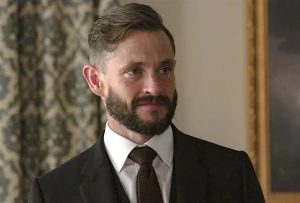| John Zabel | |
|---|---|

| |
| Status: | Alive |
| Nationality: | |
| Profession: | Foreign policy advisor |
| Others: | Benjamin Hayes (President) |
| Played by: | Hugh Dancy |
| Season(s): | 8 |
| First episode: | "F**ker Shot Me" |
| Last episode: | "Prisoners of War" |
John Zabel is President Benjamin Hayes foreign policy advisor on Afghanistan, brought in following the death of President Ralph Warner.
Biography[]
Despite his lack of experience in the military, Zabel is a brash and ardent advocate for war, and works to manipulate Hayes into escalating tensions with the Pakistan government in hopes of launching an invasion in the area. His plans are eventually thwarted when it is revealed that Warner's helicopter crashed due to a mechanical failure rather than an attack by the Taliban.
Character profile[]
In the critically acclaimed television series Homeland, one character stands out as a catalyst for intense debate and conflict within the inner workings of the government. John Zabel, a foreign policy advisor to President Hayes, consistently pushes for a more aggressive approach to international relations, often finding himself at odds with other advisors who favor a more measured and diplomatic approach.
Zabel's character is a fascinating study in the dynamics of power and influence within the realm of foreign policy. As the series unfolds, it becomes clear that his assertive nature stems from his deeply held beliefs about American exceptionalism and the need to project strength in order to maintain global stability. This unwavering conviction, while admirable in its adherence to principle, often puts him at odds with more cautious voices within the administration.
From an analytical perspective, Zabel's approach can be seen as a manifestation of realist theory in international relations. Realism asserts that states prioritize their own national interests above all else and that power plays a central role in shaping the international system. Zabel's aggressive stance aligns with this theoretical framework, as he consistently emphasizes the importance of maintaining a strong military and asserting American dominance in the global arena.
However, it is important to note that realism is not the only lens through which Zabel's character can be understood. In fact, his clashes with other advisors provide an interesting window into the underlying tension between different schools of thought in foreign policy. While Zabel embodies a more hawkish perspective, there are those who favor a more cooperative and diplomatic approach, epitomizing the liberalist school of thought.
Liberalism posits that international cooperation and institutions play a crucial role in resolving conflicts and promoting peace. Such advisors advocate for dialogue, negotiation, and multilateralism as the building blocks of effective foreign policy. These divergent viewpoints, represented by Zabel and his colleagues, provide a fertile ground for exploring the complexities and nuances of contemporary international relations.
To make the character of John Zabel even more relatable and accessible, the series portrays him as a flawed and vulnerable individual underneath his resolute exterior. This down-to-earth portrayal humanizes his character and adds depth to his role as a complex antagonist. It serves as a reminder that even the most steadfast believers in a particular ideology are not immune to doubt and struggle.
In essence, John Zabel's character in Homeland brings to light the universality of the age-old debate between realists and liberalists in the realm of foreign policy. By embodying the tenets of realism, he serves as a vehicle for exploring the implications of power and assertiveness on the global stage. Furthermore, his clashes with other advisors provide insights into the theoretical underpinnings and practical implications of these contrasting approaches.
Ultimately, Zabel's character highlights the challenges faced by policymakers in navigating the treacherous waters of international relations. Through his unwavering commitment to his beliefs and his clashes with more moderate voices, he compels us to reflect upon our own views on foreign policy and the delicate balance between projecting strength and pursuing peace. As viewers, we are left to ponder the consequences of such decisions and the enduring impact they may have on a nation's role in the world. [x]
Appearances[]
| Season 8 | ||||
| "Deception Indicated" | "Catch and Release" | "False Friends" | "Chalk One Up" | "Chalk Two Down" |
| "Two Minutes" | F**ker Shot Me | Threnody(s) | In Full Flight | Designated Driver |
| "The English Teacher" | Prisoners of War | |||